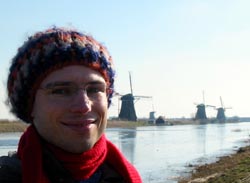World
citizen in Kinderdijk
| He
is a world citizen, yet he lives in one of the smallest villages in
the Netherlands. Jose Barros came to Eindhoven three years ago to
taste life as an expatriate. Now that he is doing a desing project
in Kinderdijk, he has all the time in the world to reflect on life
as a foreigner, on friendships and on himself. The percentage of Portuguese inhabitants of Kinderdijk rocketed when Jose Barros moved there. |
 Jose Barros: “The Netherlands has a strong mix of cultures”. |
Of course,
given its population of merely 850, each newcomer makes a big difference.
In fact there is nothing to be done. The village has one baker and one
pub, apart from the well-known much-viewed row of typically Dutch windmills.
Still, the 25-year-old TWAIO (two-year trainee research assistant) is
glad that he was able to get away from the hectic city life temporarily.
“It is good to be alone for a while, it helps to redefine certain
things.”
In the past four years Barros’ life was considerably less isolated.
One sunny day in the autumn of 1999 he arrived in the Netherlands with
his van to start a final project at the TU/e. After the project he obtained
a Master’s degree, and after that he found a position at the Stan
Ackermans Institute. Four years flew by, in which Barros gained a lot
of intercultural and personal experiences in particular, apart from technological
know-how. “Even as a child I wanted to go abroad”, the Portuguese
researcher says about his departure from Lisbon. “I knew the Netherlands
from holidays and I also knew that I liked it. It has a strong mix of
cultures, which I found interesting.”
During his first year in the Netherlands he lived in a students’
residence with various other foreigners. His contacts with people from
different cultural backgrounds made him aware of the importance of communication
especially. “When you communicate with people, your opinion changes”,
he thinks. “Thus, my idea of Russians was that they were very proud
people, like you see on TV. When I met them, they proved to be very open
and warm. And when you drink vodka with them, you make friends for life.”
Tighter circle
Meanwhile the maintenance of friendships in Portugal took a lot of time.
By now Barros has come to view the importance of this more realistically.
“I found out that some friendships weaken after all. When I came
back for my Master’s degree after the holidays in 2000, I decided
to build a tighter circle of friends here.” This decision was the
beginning of a ‘never ending social spiral’ in which Barros
kept spinning round for two years. Every party brought new faces and every
new face drew him to subsequent parties, until he realised that he simply
knew too many people. “I was jumping up and down all the time, trying
to keep in touch with everyone. In the past six months I have come to
see that I need to slow down. You have to put energy into the deepening
of friendships.”
However, starting relationships is easier than deepening them, especially
within an international community. “Most people with whom I get on
well are leaving again in a couple of months. That fact always hovers
over our heads.
I have also found out that many people do not put themselves out for a
relationship, because you easily discover somebody else in the pub.”
Nevertheless the TWAIO gradually filtered the best relations from the
vast social jelly surrounding him. Moreover, to his amazement he started
spending more time with compatriots of his. “Even when you are very
open to and curious about other cultures, it is by no means simple to
penetrate other groups”, Barros explains. He laughs, adding: “Spending
time with people from your own country alleviates the pain of being far
away”.
Ponder
Far away in Kinderdijk, where Barros does his traineeship for the SAI,
he has plenty of time to ponder the turbulent years in Eindhoven. He cherishes
his experiences as an expatriate and wishes them to every young student.
“We all live in a certain culture and it is difficult to judge things
from inside. When you live abroad you are challenged to adapt to an entirely
new social structure. In order to survive you need to form some idea of
your own identity, you have to define yourself what you want and what
you think. Us foreigners, we have a very strong ‘reference inside’.”
For the time being Barros does not yet tire of his exploratory expedition.
After completing his traineeship he first wants to go to Latin America
and then find work in Asia. It may seem risky, after all the time and
energy he has spent on developing tighter friendships. “Staying somewhere
is no guarantee of a better friendship”, Barros observes. “Besides,
people are very mobile, for my friends in Lisbon don’t live there
anymore either. First I considered it self-evident that I would return
to Portugal one day, ‘to settle down’. However, the distances
in the world are getting shorter all the time. Like when my parents moved
from the village to Lisbon and we visited my grandparents in the weekend.
I could go and live in Japan for instance, if I meet a nice girl there.
Anything is possible.”/.